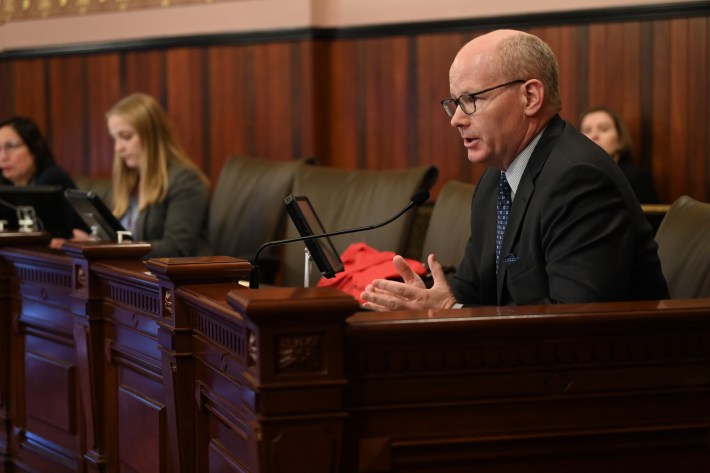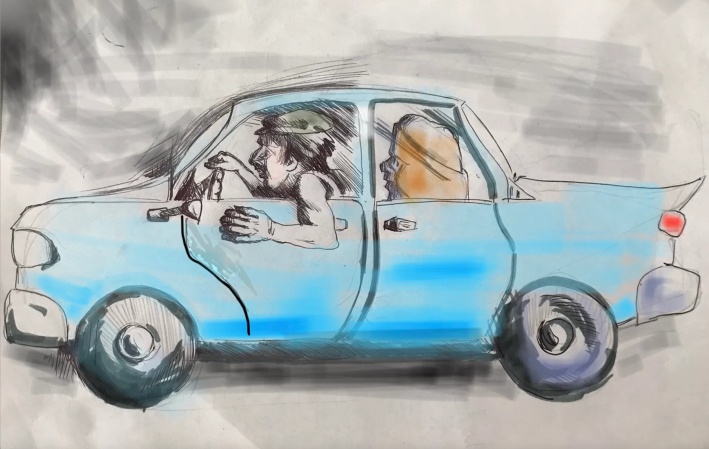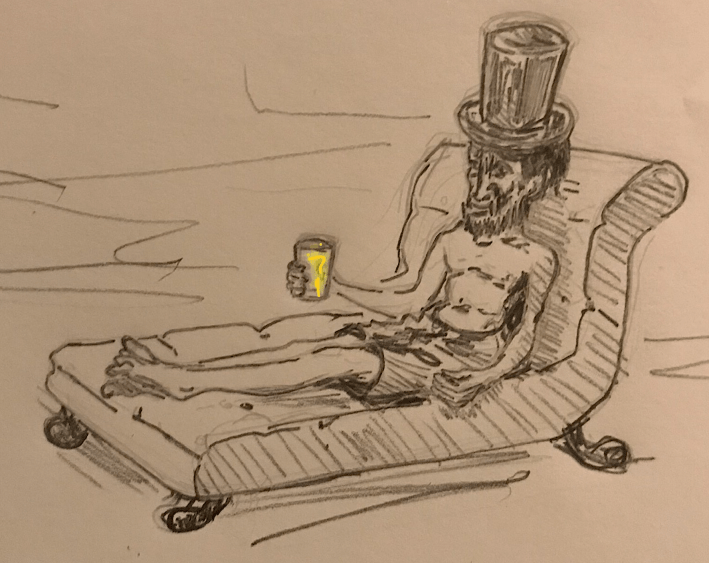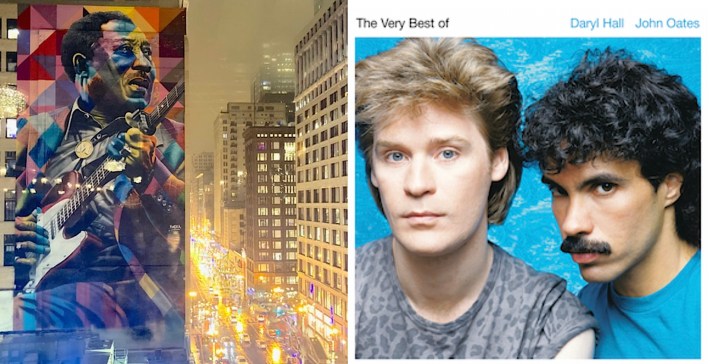"Hot summer streets and the pavements are burning, I sit around...
It's a cruel, cruel summer"
- "Cruel Summer" by Bananarama, 1983
Actually as I type this, the first day of August is a pleasantly autumnal 72F in Chicagoland. But local public transportation workers, riders, and advocates have been feeling angst while waiting around this season. We're hoping that Illinois lawmakers will hold an emergency summer legislative session to pass a transit funding bill.
As Streetsblog readers know all too well, if the looming $771 million fiscal cliff isn't addressed soon, the CTA, Metra, and Pace will probably need to slash about 40 percent of bus and train runs, and give pink slips to 3,000 employees.
On the last day of May, the conclusion of the Prairie State's spring legislative session, the Illinois Senate voted for HB 3438. That would generate some $1.5 billion to preserve and upgrade Northeast Illinois transit, and raise about $200 million for downstate systems. But House leaders decided not to vote on the bill that night.
Last week, I interviewed HB 3438 sponsor Sen. Ram Villivalam for an update on efforts to fill the budget gap. When I asked if the summer vote is definitely going to happen, he replied, "That's above my pay grade. Obviously, that's a decision by [Governor JB Pritzker] and the Senate President [Don Harmon] and the House Speaker [Emanuel "Chris" Welch]."
Since then, I've been working on getting the answer from the horses' mouths. Today I spoke with Oak Park-based Senate President Harmon, who shed some light on what's going on. The interview has been edited for clarity and brevity.
John Greenfield: You voted for Sen. Villivalam's bill. Why did you support legislation to reform transit governance and raise money to fund public transportation?
Senate President Don Harmon: A robust public transportation system is vital to the economic wellbeing, not only of the Chicago metropolitan region, but also the entire state of Illinois. And right now we're facing an existential crisis. This also presents a once-in-a-generation opportunity to enact meaningful, rider-focused reforms that help us build the transit system for 2050, and not just try to patch back together the transit system from 1975.
It's an opportunity we should not miss that, however, is expensive. The Senate passed a bill that included both the governance reforms and revenue to make that possible. If stakeholders don't like the revenue plan the Senate adopted – and frankly, I don't care for some of the ingredients in the plan – we need people to come back with counter-proposals that allow us to build that transit system that residents deserve.

JG: What aspects of the funding proposal are you not a fan of?
SPDH: Well, there's no revenue ingredient that is going to be without opposition. I think that the [$1.50 surcharge for retail and restaurant deliveries made by motor vehicle] is going to require a fair amount of digestion, and I don't know if folks are ready for that at the moment.
But again, we're very open to other proposals, if we can put together the revenue needed. There have also been some pleasant surprises. The [Regional Transportation Authority] just announced that they're expecting $150 million more in sales tax receipts than they were budgeting. So I think there are different ways to peel the onion.

JG: Good metaphor. So would there be any advantage advantages to waiting until the fall veto session to have the vote on the transit funding and reform bill? I know that that if you do it in the summer, you would need a three-fifths majority...
SPDH: Even in the fall, we'll need a super majority for something that's effective immediately. We'd have to wait until the new year to go back to a simple majority [an over 50 percent vote].
JG: So is it worth having the vote as soon as possible?
SPDH: I would call the Senate back into session immediately if there was an agreed upon bill on which to vote. But until we do that, it doesn't make much sense to send everyone down to Springfield to stare at each other.
JG: Okay, so is this something people are negotiating about right now – is the discussion going to happen if there's no vote scheduled? You folks passed the bill in the Senate late in the evening on May 31, as the spring legislative session was wrapping up.
After that, Rep. Kam Buckner [D-Chicago], who's one of Sen. Villivalam's allies trying to get transit funding, indicated that they weren't pleased that they received the bill at the 11th Hour, and that would have been "disingenuous" for them to vote on it.
[In early June, Rep. Buckner told the Chicago Tribune that House leaders didn't know the Senate might include the $1.50 delivery fee in the legislation, so they felt it would be "irresponsible" to bring the bill for a vote without further analysis.]
SPDH: I don't think anyone in the building was unfamiliar with or surprised by the bill that the Senate passed on May 31. I wish we could have passed it a bit earlier, but some of the back and forth between chambers delayed it.
JG: I think Buckner specifically singled out what we at Streetsblog call the "burrito taxi tax," the $1.50 delivery surcharge. He indicated that they were surprised that wound up in the bill.

SPDH: I don't think anyone in the building should have been surprised by what was in the bill the Senate passed. These conversations went on all through the spring session, and before. I often joke, every bill takes a minute to pass, but it takes months and months to prepare... I think Sen. Villivalam did a very nice job of putting together the package that we could we could pass.
JG: OK. So what would you like to see happen with the bill moving forward? The governor said last week at the Union Station celebration that he thought it was unlikely that there would be a summer session. Do you think it would be a good idea to have a summer session?
SPDH: What I would like is for anybody who lives in the district I represent to be able to walk out their front door, get on a bus, transfer to a train, transfer to another bus, and get to their office or their doctor or their school without waiting too long, without feeling unsafe, without being in an unclean vehicle, and without knowing whether they're on a CTA bus, a Metra bus or a Pace bus. We need to improve the rider experience so that people are excited about taking public transportation, and not begrudgingly climbing up the steps onto a bus.
That's my goal. As soon as there's an agreement on how to put this together, I will happily call the Senate back into session to vote on it. But until there's an agreement, it's counterproductive. The Senate did pass a bill. It does not need to be in the final bill, but we're eager to hear constructive criticism and counter-proposals, and to-date we haven't heard many.
JG: I mean, would you be more likely to hear the constructive criticisms if you got together in Springfield?
SPDH: No, and I worry that if we go down to Springfield without an agreement, all we're going to do is gin up a bunch of Chicago-bashing and other counterproductive rhetoric that will dig people in deeper and make it harder for us to pass a meaningful bill that benefits the folks who take the 'L' or the bus.
JG: Okay, so are you telling me that during the summer break, people have not just been hanging out by the pool drinking lemonade, but instead, there is conversation going on backstage about the bill?

Like, have you been having conversations with with your colleagues at the House about what they would want to see in the bill to be able to vote for it?
SPDH: I have not been sitting by a single pool, and I don't know if I've had more than one glass of lemonade all summer. We work when we're "working in district." It's a huge part of the job, and people are certainly having conversations all across the state. And we're happy to convene more formal meetings as soon as there is some glimpse of a counter-proposal or an offer to tackle this problem another way.
JG: OK, there have been conversations going on this summer with you and your colleagues at the House. How do you feel those have been going - do you think that the House reps that you've been talking to have been pretty responsive and seem to want to work with you to get this passed?
SPDH: I've been very supportive of Sen. Villivalam's efforts. I know that he continues to work on a very regular basis on this. I have not talked to his counterparts [in the House] on transit. I'd like to give those members the elbow room to come to some conclusion and bring it back to us for consideration.
JG: Has Sen. Villivalam been talking to his counterparts at the House like, like Rep. Buckner?
SPDH: I don't want to speak for him, but I know you've spoken to Sen. Villivalam.
JG: Yeah. He seemed pretty interested in getting the summer session going.
So do you any advice for us transit advocates? We really don't want to have a Philadelphia-style situation where there's a 45 percent cut to transit service because the state didn't take action to pass funding. If we really want this to happen sooner than later, what should we do?

SPDH: We're allied. I want to see the best public transportation system in the country and if not the world.
It's going to require a lot of stakeholders to stop worrying about whether they are gaining or losing power and start focusing on the riders, the people that we represent, that send us to Springfield, that elect us to county boards and the like. So I would encourage you to continue talking to all of the people who have a seat at the table in this conversation, and remind them that this is a conversation about riders, not about which politician gets which power.
But the conversations are continuing, and I believe we're going to land this plane.
Read Streetsblog's recent interview with HB 34348 sponsor Sen. Villivalam here.

Do you appreciate Streetsblog Chicago's reporting and advocacy on local sustainable transportation issues? If you haven't already, please consider making a tax-deductible donation here to help us continue publishing in 2026. Thanks!





